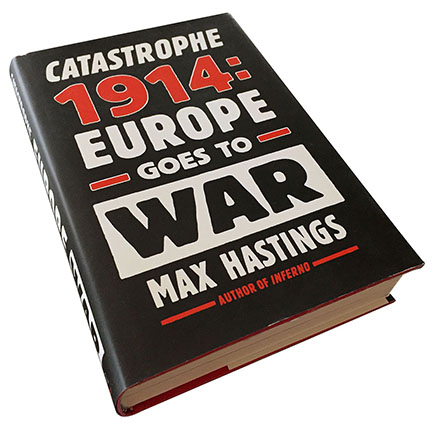14-18: Catastrophe 1914: Europe Goes To War

563 pages to describe Europe from June 28 to Dec. 31--1914...
By Steven J. Torreyon December 27, 2015
The assassination of Archduke Francis Ferdinand and his wife Sophie is dismissed as 'just an excuse" and any event could have set off the war.
Winston Churchill gets come-uppance in this book. Looking more like a person long on wind and short on reason, discipline, and restraint. His October 1914 Antwerp incursion by Naval Marine forces to fight on land with ill-prepared, ill-equipped naval personnel, too small to fight against a well trained, larger German military force. The resulting debacle to the English should have been no surprise--there was a round of criticism for rank amateurs controlling and dominating military tacticians. (Chapter 14--"Open Sky--1, (page 442ff.) Churchill's Adventure.) Churchill would try a similar stunt on the eve of the Normandy Invasion requesting major changes, after the professional Military had finalized the plan. The Military refused any adaptation of the Normandy Plan and gave Churchill a dressing down for his ignorant, thoughtless, and hazardous intervention. (One should always see the dark side, the deficiencies of one's heroes.)
Hasting describes not only the development of the war, the tactics of the war, the personalities of the war--but he describes with letters and diaries the viewpoint of the men fighting in the trenches--describing it for the hell it was. And he reminds how the war changed world society forever.
Like so many of modern historians, he sees the war as crucial for the Western Allies to win, just as it was crucial for the Western Allies to defeat the Nazi maw. That the war should never have been started goes without saying. The German Military deluded themselves into thinking their planning would bring about a short war--with them dominating Europe; and the truth of the matter, their Military Command were not even close to the level of competency to bring about a short war. That the French Military Command was equally incompetent only prolonged the war. The British forces were in 1914 insufficient in numbers to make a to make a quick ending.
The German atrocities of World War One would presage the atrocities of the Second World War. (Louvain, etc.)
One the ill-conceived war began, there could only be one resolution--unconditional surrender, total defeat of the German forces. And that would take more than four years to accomplish with the loss of more than 8,258,831 lives. From July to Dec 1914 of the war alone took more than 1,536,655 lives all total. It was a high price to pay, for what...?
And that 'for what?' is a crucial question. German imperialism of Kaiser Wilhelm II had to be stopped. That was what the war was about. It was not simply a temper tantrum between the 1st cousins George V, Wilhelm II, and Czar Nicholas II.
A table of war casualties by battle, by date, by country would be helpful especially for those who want facts; you would be surprised at how difficult it is to track down this basic important information. There were maps aplenty for several of the battles, clearly drawn. (In my edition--an 'uncorrected proof' there was no index.)
The other important point: soldiers / Military were fighting a modern war with deadly weapons intended for mass killing with an 19th century mentality about war, and an 19th century technology. Horses to drive armaments, oxen carts, sabers as weapons, armaments not up to the task, a sense that war is simple and quick and could be ended easily, a sense of the need to take land...as evidence of success...
In the end, the book made for some very sad reading. War is not pretty, and this book reminds of that simple fact. Once entered, not easily ended. And we all know from History that the tragedy of World War I led to the tragedy of World War II--as an inevitable dénouement.